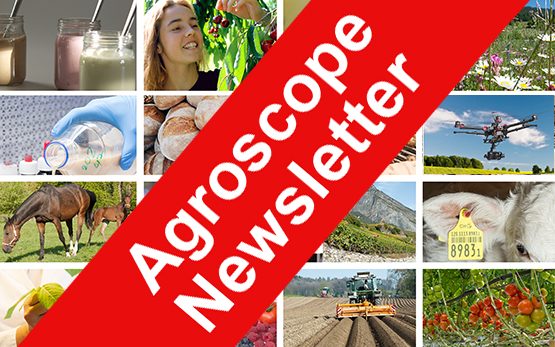New test method: Simulating in vitro what happens with proteins in vivo
Bern, 19.03.2019 - Take protein – for instance, in the form of skimmed-milk powder – and put a pinch of it in a test tube. To determine how efficiently this dietary protein is converted into endogenous protein, follow the recipe described in the online science magazine Nature Protocols step-by-step in the laboratory. And voilà, the value of the protein, i.e. its benefit for humans, is revealed. An international team of scientists has successfully developed a harmonised method for the in vitro digestion of proteins. At the helm of the 15-nation research team are Ireland, Spain, and Switzerland, represented by Agroscope.
Proteins, peptides and free amino acids are the three stages of protein digestion. After food is broken down into smaller pieces in the mouth by chewing, these digestive steps in both humans and pigs take place chiefly in the stomach and small intestine. The present internationally published protocol describes how these digestive stages can be reproduced in vitro; the method is ‘physiological’, i.e. it reflects the natural conditions in the digestive tract.
Simulating human nutrition in vitro as accurately as possible
The in vitro dietary-protein digestion method is the result of an international collaboration, with the participation of Agroscope in the COST Infogest project from 2011 to 2015. Infogest is an open research network with over 260 specialists in the food, biochemistry, nutrition and health sectors, from 90 institutions in 32 countries; the method published in Nature Protocols was authored by an Infogest subgroup consisting of researchers from 15 countries, whose main objective was to understand the impact of foods on human health.
Within the food research sector, the COST Infogest project aimed to make use of a simple system to simulate human nutrition as accurately as possible in vitro. The methods used in the various partner countries had to be adapted and harmonised, so that researchers could compare and exchange their results. By comparing the results of the digestion protocols of the different Infogest members for/usingskimmed-milk powder, they derived a harmonised protocol. The methods developed by Agroscope to monitor the different stages of digestion, such as the (nowadays internationally recognised and used) peptide model derived from protein degradation (amino-acid counting method), is of crucial importance in this research work.
For the validation of the new in vitro method, researchers tested how accurately it reflected natural/physiological digestion. The results of experiments carried out in parallel in the laboratory and using pigs were highly concordant. The bottom line is that the in vitro system allows us to draw very precise physiological conclusions; it is ideal for simulating digestive processes, and evaluating them both qualitatively and quantitatively.
New method can replace animal testing
Nature Protocols, where the in vitro protein-digestion method was published, is an online science magazine of the Nature Publishing Group. It only publishes high-quality, citable, internationally peer-reviewed protocols which describe scientific methods in recipe format. The method that has just been published is a new edition of a prototype, already published in 2014, which contains suggestions for improvements and more detailed explanations of the different steps of the method. "A method published in “Nature Protocols” must be used and recognized worldwide, but it must contain something new," explain Charlotte Egger and Reto Portmann, who work at Agroscope on the Infogest project. "This published protocol describes a highly cited method; the prototype of the method published by the same international team of authors in 2014 has already been cited more than 500 times. Furthermore, the method could enable the replacement of various animal and clinical experiments in future, in keeping with the ‘three Rs’ principle in animal testing: ‘replace, reduce, refine’.
International research into protein digestibility continues. After the development of the in vitro digestion method and the international publication of the related protocol, the following year will see international standardisation according to the ISO-IDF standard. What’s more, in 2018 Agroscope launched a PhD thesis with the aim of implementing this in vitro method in practice. For the time being, the value of ten different protein sources will be tested. These proteins will ideally then become new international standards. The long-term aim of this work is not only to improve dietary recommendations for humans, but also to determine the ecological footprint of foods on the basis of their value. Initial results are expected in 2021.
Link to protocol in Nature Protocols
https://rdcu.be/brEMd
Address for enquiries
Charlotte Egger
Biochemistry of Milk and Microorganisms
Schwarzenburgstrasse 161, 3003 Bern / Switzerland
charlotte.egger@agroscope.admin.ch
+41 58 463 81 65
Christine Caron-Wickli
Media Spokeswoman
Schwarzenburgstrasse 161, 3003 Bern / Switzerland
christine.caron-wickli@agroscope.admin.ch
+41 58 466 72 42
Publisher
AGROSCOPE
http://www.agroscope.admin.ch






